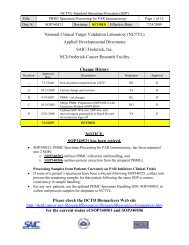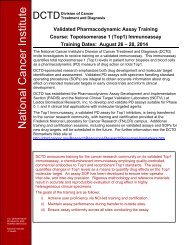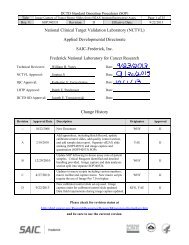National Cancer Institute - NCI Division of Cancer Treatment and ...
National Cancer Institute - NCI Division of Cancer Treatment and ...
National Cancer Institute - NCI Division of Cancer Treatment and ...
You also want an ePaper? Increase the reach of your titles
YUMPU automatically turns print PDFs into web optimized ePapers that Google loves.
■ Support development <strong>and</strong> delivery <strong>of</strong><br />
image-guided interventions<br />
■ Accelerate the delivery <strong>of</strong> new imaging<br />
agents <strong>and</strong> technology for research <strong>and</strong><br />
clinical use<br />
■ Improve imaging informatics infrastructure<br />
■ Advance the role <strong>of</strong> imaging to detect<br />
<strong>and</strong> treat preneoplastic lesions<br />
■ Improve underst<strong>and</strong>ing <strong>of</strong><br />
communications between cancer cells<br />
<strong>and</strong> their environment<br />
Lung cancer was chosen as an I2 Team<br />
emphasis because <strong>of</strong> the inescapable<br />
facts that five-year lung cancer survival<br />
rates have improved only modestly over<br />
the past three decades, that only a fraction<br />
<strong>of</strong> lung cancers are diagnosed at an early<br />
stage, <strong>and</strong> that even the most intensive<br />
smoking cessation programs succeed less<br />
than 25 percent <strong>of</strong> the time. Therefore,<br />
merely doing more <strong>of</strong> the same—even<br />
with higher levels <strong>of</strong> funding support—<br />
would be unlikely to dramatically improve<br />
the status quo.<br />
In 2005, the Lung <strong>Cancer</strong> I2 Team—<br />
composed <strong>of</strong> <strong>NCI</strong> staff <strong>and</strong> extramural<br />
researchers under the leadership <strong>of</strong><br />
Dr. Margaret Spitz <strong>of</strong> the M.D. Anderson<br />
<strong>Cancer</strong> Center—issued a set <strong>of</strong> recommendations<br />
to accelerate <strong>and</strong> exp<strong>and</strong><br />
efforts against lung cancer by focusing<br />
on strategies with enormous opportunity<br />
<strong>and</strong> potentially high returns. The recommendations<br />
focus on critical strategies<br />
that together serve as a pathway toward<br />
the 2015 goal, not by incorporating<br />
incremental strategies, but rather by focusing<br />
on transformational strategies.<br />
50 ■ P R O G R A M A C C O M P L I S H M E N T S 2 0 0 6<br />
■ ■ ■<br />
Optical molecular imaging is one <strong>of</strong> the fastest growing imaging<br />
modalities for cancer research. Establishing the network during the early<br />
phase <strong>of</strong> technology development will bring the different communities<br />
together to accelerate translation toward delivery <strong>of</strong> these technologies.<br />
The team envisions a strategic role for<br />
imaging in improving early detection <strong>of</strong><br />
lung cancer <strong>and</strong> precancerous conditions,<br />
thereby improving the likelihood <strong>of</strong> cure.<br />
The team’s plan highlights the need for<br />
effective <strong>and</strong> validated early detection<br />
techniques. It builds upon various lungspecific<br />
projects <strong>of</strong> existing in vivo imaging<br />
initiatives to achieve objectives related to<br />
lung cancer at substantial cost savings.<br />
Additionally, the Lung <strong>Cancer</strong> I2 Team<br />
proposes to advance the science <strong>of</strong> imaging<br />
response assessment with molecular<br />
imaging technologies that directly reflect<br />
response to targeted therapies. The team<br />
also envisions a role for CIP in providing<br />
uniform, high-quality imaging acquisition,<br />
quality control, <strong>and</strong> analysis <strong>and</strong> creation<br />
<strong>of</strong> a lung cancer imaging meta-directory<br />
within the conduct <strong>of</strong> clinical trials.<br />
Network for Translational<br />
Research: Optical Imaging<br />
http://imaging.cancer.gov/<br />
programs<strong>and</strong>resources/<br />
specializedinitiatives/ntroi<br />
Contact:<br />
Houston Baker, Ph.D.<br />
301-594-9117, bakerhou@mail.nih.gov<br />
The Network for Translational Research in<br />
Optical Imaging (NTROI) was implemented<br />
in September 2003 as a demonstration<br />
project to show that technological innovations<br />
developed under CIP grants could<br />
benefit from coordinated attention to the<br />
processes <strong>of</strong> validation <strong>and</strong> translation<br />
toward clinical use. The intent <strong>of</strong> this<br />
program is to address the fact that too<br />
many medical inventions fail to progress










